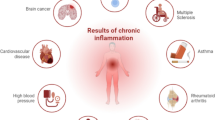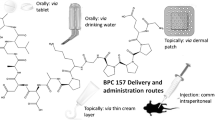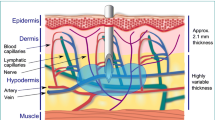Abstract
Objective and design:To study the involvement of all-trans retinoic acid (ATRA) in the development and maintenance of inflammatory pain.
Subjects:Adult male Wistar rats and murine neuro2a and human SH-SY5Y neuroblastoma cells.
Treatment:Soft-tissue inflammation was induced by the intraplantar administration of 100 μl of carrageenan λ. The oral treatment with either ATRA or vehicle lasted for seven days and consisted in a dose of 15 mg/kg the first two days and a dose of 10 mg/kg the following five days. Neuroblastoma cells were incubated for 16 h with ATRA.
Methods:Rats were tested twice daily for intensity and evolution of withdrawal reflexes evoked by mechanical and thermal stimulation. The expression of COX enzymes was studied in spinal cords and neuroblastoma cells by western blot.
Results:The animals treated with ATRA showed a significantly more intense development of mechanical allodynia (p < 0.01), mechanical hyperalgesia (p < 0.01), thermal hyperalgesia (p < 0.001) and reduction of threshold for mechanical (29 ± 4 vs. 60 ± 6 mN, p < 0.001) and thermal stimulation (12 ± 0.3 vs. 8.4 ± 0.3 s, p < 0.001) than control animals. Recovery to mechanical baseline data was slower in animals treated with ATRA, the main difference was observed in the test carried out on day 2, p.m. In neuroblastoma cells incubated with ATRA, a concentration-dependent increase in the expression of COX-2 protein was observed. Changes in the expression of COX-1 enzyme were not clear. An increase in COX-2 expression in the lumbar spinal cord was also observed in animals treated with ATRA.
Conclusions:A clear relationship between the oral administration of ATRA and an enhancement of the nociceptive withdrawal reflexes was observed in rats. This relationship was associated with an increment of the expression of the COX-2 enzyme.
Similar content being viewed by others
Author information
Authors and Affiliations
Corresponding author
Additional information
Received 9 September 2003; returned for revision 7 November 2003; accepted by G. Geisslinger 26 January 2004
Rights and permissions
About this article
Cite this article
Romero-Sandoval, E.A., Alique, M., Moreno-Manzano, V. et al. The oral administration of retinoic acid enhances nociceptive withdrawal reflexes in rats with soft-tissue inflammation. Inflamm. res. 53, 297–303 (2004). https://doi.org/10.1007/s00011-004-1261-5
Received:
Accepted:
Published:
Issue Date:
DOI: https://doi.org/10.1007/s00011-004-1261-5




